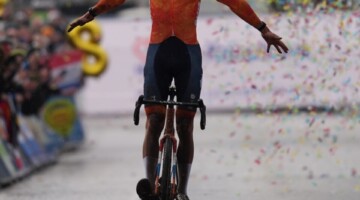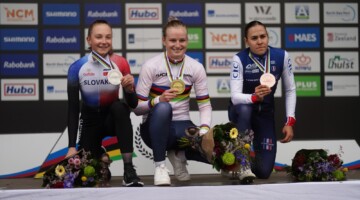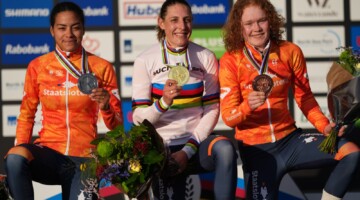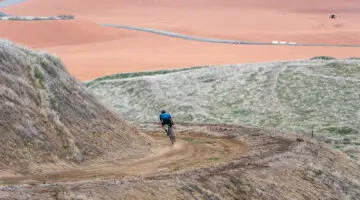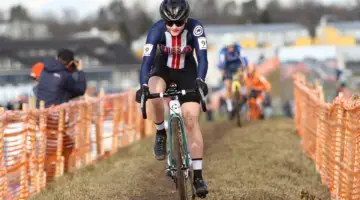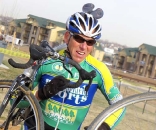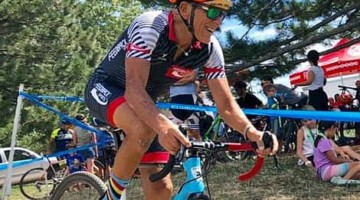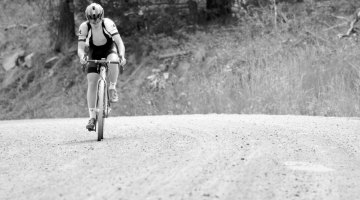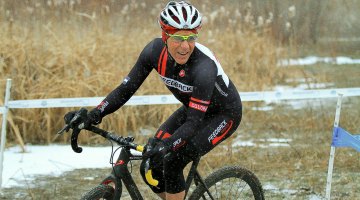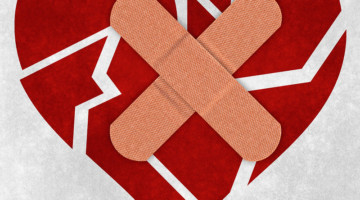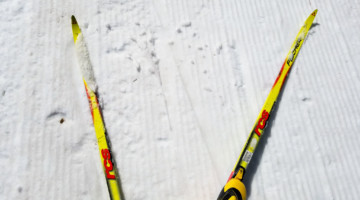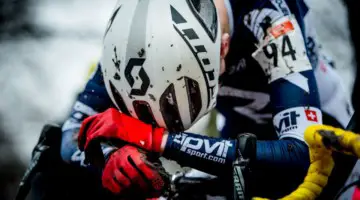Cyclocross Magazine columnist and Masters racer Lee Waldman takes a minute to reflect on the charmed life than many of us cyclists live, and ways in which we could give back. Call it altruism, or maybe it’s a selfish act in itself because helping others makes us feel good. We won’t settle that debate, but Waldman shares some of the things he does to improve his self-esteem and invites you to do the same. In case you missed it, go back and check out Lee’s previous column as he Relearns Old Lessons.
by Lee Waldman
It’s important, I think, to be more than someone who goes through life taking what others offer. I know that I always feel better when I’m able to not only accept the offerings of others, but can then also turn around and give something back in return. There are times when that can be a difficult concept for an athlete. To be good at anything, one needs to be relatively self-centered. That doesn’t necessarily mean selfish: simply self-aware.
As athletes we tend to spend the majority of our time taking things from others. We get massages to help our bodies recover from training stresses, and mechanics keep our machines running smoothly and prevent detrimental malfunctions. If we’re lucky, we have someone to cook for us so that we can spend the maximum time possible recovering. We take time away from jobs and families to pursue our passions – and we all do this to varying degrees, depending on where we are in our lives. I currently have the ability to do this more now than when I was in my 20s raising kids and starting a business. The extra time and increased focus has, I know, helped my riding a lot. But as with everything in life, there’s always another side to this coin.
I’ve been thinking a lot lately – always a recipe for disaster – about how much we, as riders, owe to that army of support that makes it possible for us to race. Without family, officials, race promoters, volunteers and sponsors, we’d just be a bunch of guys and girls wearing funny clothes, riding our bikes in circles in some parking lot or open field.
As soon as I started down that road of thinking, the question arose: What do we do to give back to the sport? It’s that whole “pay it forward” idea. I’ve done a bit of everything over the past three decades: sponsored and run teams, promoted races and held multiple offices in our local racing association. It wasn’t for the money, the accolades, certainly not for the swag. Giving back to the community is something that has always been important to me – that’s largely why I became an educator. I’ve benefited in so many ways from my involvement in bicycle racing that becoming involved in the various behind-the-scenes aspects seemed like one way to close the circle.
Sometimes giving back can be the simple act of thanking the race officials before I leave a venue. They put in countless hours for little money, simply out of a love of the sport. After I’m done racing, after I’ve gone home, showered and eaten, they’ll still be out there. It always makes me feel good when I take that time. If you haven’t tried it, then you might think about making that gesture the next time you race. It’s a small act but it goes a long, long way with overworked and under-appreciated officials. I try to do the same for the race promoters and their staff. For the most part, they are racers themselves who have given up a weekend to keep events alive. I know how it makes me feel when a rider thanks me, and I want to make sure I always return the favor.
I’m very proud of one of the projects my team has taken on this year. We’re working with a group of committed youth – young men who have made big mistakes in their lives and are paying for it. They are incarcerated, some for up to five years, and some for serious crimes. The facility we are working with houses some of the most violent youth offenders in our state, some of whom will go on to adult corrections. I’ve met a lot of them over the last year and they’ve helped my team design, build and run our cyclocross series. Showing up at the crack of dawn to set up and leaving after the last race had ended, they worked as hard, if not harder, than most of my team members.
This summer many of those same young men are helping me promote a short track mountain bike series. They’ll work alongside the team, mowing the courses, and on race days to make sure everything runs as smoothly as possible.
What do they get back for their efforts? We donate $1.00 out of every entry fee back to the facility. That may not seem like a lot, but in light of the fiscal crisis that every governmental agency is experiencing, that money makes a big difference for these young men. But that’s only part of the return. Working with us also reinforces many of the lessons that they learn “inside the fence.”
As soon as these kids are committed, they begin to work on learning trust for themselves and for each other. They talk a lot about respect – again, respect for themselves and for others. The most important lesson that they learn while committed is that they have a responsibility to repair the damage they’ve done to the community through their illegal acts. Those that learn the lessons do pretty well upon release, and my team gives these young men another avenue to demonstrate that they’ve learned some of these lessons.
What lessons have I learned from working with them? I’ve learned that “there for the grace of God go I.” A lot of these youth are wonderful human beings who ended up in bad situations. I’ve read their journals and heard their horrendous stories. It makes me feel good to my core to get to know them and to help them see that there are people who will like and respect them for who they are now, not merely judge them for what they’ve done in the past. I’ve learned acceptance in place of judgment. Most of all I’ve learned, again, how good it feels to give something back.
I get to share something that I love with a group of kids who probably had never seen a bike race. If even one of them leaves the facility with another option, one more positive than recidivism, then I’ve accomplished something important to me – I’ve given an individual who might have fallen through the cracks again another way to feel good about himself. I hope that I’ve given him an opportunity to learn some of the lessons that I’ve learned from riding my bike – to be independent, focused, dedicated, patient and humble. Good lessons for cycling, and for life.
So that’s what I’ve done in my attempt to give back. I’m sure many of you have some great stories of your own experiences. If so, drop a comment below. If not, this coming season is a great opportunity to create your own.
Thanks for reading. Now, go ride!
It’s important, I think, to be more than someone who goes through life taking what others offer. I know that I always feel better when I can not only accept the offerings of others, but that I can then turn around and give something back in return. There are times when that can be a difficult concept for an athlete. To be good at anything, one needs to be relatively self-centered. That doesn’t necessarily mean selfish: simply self-aware.
As athletes we tend to spend the majority of our time taking things from others. We get massages to help our bodies recover from training stresses and mechanics keep our machines running smoothly and prevent detrimental malfunctions. If we’re lucky, we have someone to cook for us so that we can spend the maximum time possible recovering. We take time away from jobs and families to pursue our passions. And we all do this to varying degrees, depending on where we are in our lives. I currently have the ability to do more of this than I did when I was in my 20s raising kids and starting a business. The extra time and increased focus has, I know, helped my riding a lot. But as with everything in life, there’s always another side to this coin.
I’ve been thinking a lot lately – always a recipe for disaster – about how much we, as riders, owe to that army of support that makes it possible for us to race. Without family, officials, race promoters, volunteers and sponsors, we’d just be a bunch of guys and girls wearing funny clothes, riding our bikes in circles in some parking lot or open field.
As soon as I started down that road, the question arose: What do we do to give back to the sport? It’s that whole “pay it forward” idea. I’ve done a bit of everything over the past three decades: sponsored and run teams, promoted races, held multiple offices in our local racing association, and there’s probably more that I’ve now forgotten. In every instance I did what I did not for the money, not for the accolades, certainly not for the swag. Giving back to the community is something that has always been important to me – in many ways that’s what becoming an educator meant to me. I’ve benefited in so many ways from my involvement in bicycle racing that becoming involved in the various behind-the-scenes aspects seemed like one way to close the circle .
Sometimes giving back can be the simple act of thanking the race officials before I leave a venue. They put in countless hours for little money, simply out of a love of the sport. After I’m done racing, after I’ve gone home, showered and eaten, they’ll still be out there. It always makes me feel good when I take that time. If you haven’t tried it then you might think about it next time you race. It’s a small act but it goes a long, long way with overworked and under-appreciated officials. I try to do the same for the race promoters and their staff. For the most part they are racers themselves who have given up a race weekend to keep events alive. I want them to know that their efforts are appreciated as well. I know how it makes me feel when a rider thanks me, and I want to make sure I always return the favor.
I’m very proud of one of the projects my team has taken on this year. We‘re working with a group of committed youth – young men who have made big mistakes in their lives and are paying for it. They are incarcerated, some for up to five years, and some for serious crimes. The facility we are working with houses some of the most violent youth offenders in our state, some of whom will go on to adult corrections. I’ve met a lot of them over the last year and they’ve helped my team design, build and run our cyclocross series. Showing up at the crack of dawn to set up and leaving after the last race had ended, they worked as hard, if not harder, than most of my team members.
This summer many of those same young men are helping me promote a short track mountain bike series. They’ll work alongside the team, mowing the courses, and on race days to make sure everything runs as smoothly as possible.
What do they get back for their efforts? We donate $1.00 out of every entry fee back to the facility. That may not seem like a lot right now, but in light of the fiscal crisis that every governmental agency is experiencing, that money makes a big difference for these young men. But that’s only part of the return. Working with us also reinforces many of the lessons that they learn “inside the fence.”
As soon as these kids are committed, they begin to work on learning trust for themselves and for each other. They talk a lot about respect – again, respect for themselves and for others. The most important lesson that they learn while committed is that they have a responsibility to repair the damage they’ve done to the community through their illegal acts. Those that learn the lessons do pretty well upon release, and my team gives these young men another avenue to demonstrate that they’ve learned some of these lessons.
What lessons have I learned from working with them? I’ve learned that “there for the grace of God go II.” A lot of these youth are wonderful human beings who ended up in bad situations. I’ve read their journals and heard their horrendous stories. It makes me feel good to my core to get to know them and to help them see that there are people who will like and respect them for who they are now, not merely judge them for what they’ve done in the past. I’ve learned acceptance in place of judgment. Most of all I’ve learned, again, how good it feels to give something back.
I get to share something that I love with a group of kids who probably have never seen a bike race. If even one of them leaves the facility with another option, one more positive than recidivism, then I’ve accomplished something important to me – I’ve given an individual who might have fallen through the cracks again another way to feel good about himself. I hope that I’ve given him an opportunity to learn some of the lessons that I’ve learned from riding my bike – to be independent, focused, dedicated, patient and humble. Good lessons for cycling, and for life.
Now, go ride!

